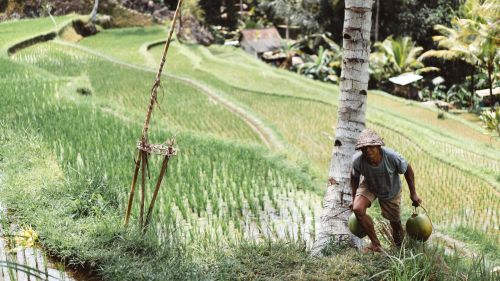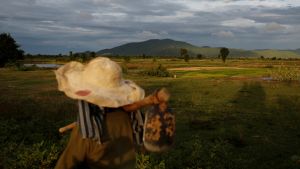Hunger Hotspots, Beefy Promises, & Farmers to Families

Check out our weekly round up of the top news and research in food, agriculture, and global development.
Top Story
Hunger Hotspots
Twenty countries will see soaring acute hunger in the coming months, according to a new report jointly issued by FAO and WFP. The Hunger Hotspots report identifies armed conflict and the COVID-19 pandemic as key drivers of acute food insecurity. People in South Sudan, Yemen, and norther Nigeria are most at risk, due in large part to ongoing conflict. Every major region of the world, however, is projected to see sharp rises in acute hunger. The report identifies short-term actions to address both existing and future needs in every hotspot.
Council Insights
Farmers to Families
Hunger is on the rise in America. Due to the pandemic, food insecurity in the US has doubled, now affecting nearly 1 in 4 households. In response to this crisis, last year the USDA created The Farmers to Families Food Box Program to alleviate food supply chain disruptions, support producers, and address food security challenges. To date, the program has spent over $15 billion, yet many smaller producers and minority farmers have been left out and the intended community beneficiaries are voicing concern about the food they are receiving. On Thursday, April 8, join Distinguished Fellow Ertharin Cousin to discuss what comes next for the program with experts from the Greater Chicago Food Depository, Produce Alliance, and more!
Food & Agriculture
Past Incentives, Present Problems
Dozens of trains were delayed due to protestors blocking railway tracks in northern India to mark the fourth month of farmer unrest. The laws spurring the unrest are an attempt to reform a system created to prevent famine in the 1960s by incentivizing wheat and conventional rice. Higher value and often more nutritious crops are not incentivized in the same way.
Like Water for Coffee
Heavy rains pose a problem for over half a million coffee-growers in Colombia this year. Producers must avoid COVID-19 infections while working to maintain their income despite unfavorable weather and potential rises in fertilizer prices.
Lingering Fears
As many as half of the munitions buried in Cambodian soil in the aftermath of the Vietnam War have not exploded. As a result, farmers in Cambodia are usually wary of richer, darker soil for fear of explosions, and some only plant crops in parts of their farms they know are safe. A quantitative study of harvests has revealed that this process has cut farmer incomes by 40 per cent over the last 50 years.
Deeper Dive
Basmati or Not-i
Indian government markets & price subsidies for grain don’t apply to basmati rice. So, what sets it apart? Basmati is a long-grain rice, named for being fragrant. It had a geographic indication (GI), meaning that rice sold as such should come from one of seven northern Indian states. Pakistan, the only other basmati growing nation, disputed the claim and received its own basmati GI.

A farmer walks to work in Kampong Speu, Cambodia.
Data Crunch
Tracking Water from Space
Tracking agricultural water use via satellite remote sensing can help countries use agricultural water more productively and efficiently. FAO’s Water Productivity through Open-access of Remotely sensed derived data (WaPOR) provides satellite data on evapotranspiration that can help governments and local agencies account for how much water is available and who can access it.
Resilience
Beefy Promise
The world’s largest meat processor, Brazilian company JBS, has vowed to reach net-zero greenhouse gas emissions by 2040. JBS saw record profits in 2020, which environmentalists say could go a long way if invested in the production chain. Eliminating Amazon deforestation in its supply chain is a critical step in reducing the meat giant’s footprint.
Big Ideas
Conflicting Views, Low Results
A transdisciplinary study from the University of Vienna has found critical gaps between agriculture research and practice. Surveyed scientists and farmers had diverging views on biodiversity, ecosystem services, and management measures. Critically, the two groups differed on which information is most important for decision making, highlighting a need for better coordination between research and policy.
DC Report
Filling the Gaps
After previous COVID-19 assistance packages for farmers were found to have a number of disparities in distribution and access, the USDA established a new initiative to address the gaps. This new “USDA Pandemic Assistance for Producers” initiative aims to ensure equitable access to assistance. The USDA will utilize existing programs in addition to creating new ones to improve outreach to underserved producers.
Big Actors
Borderlands
The UAE has offered to mediate disputes between Ethiopia and Sudan over borderlands and contested dam. The fertile farmland on the border is and has been worked by Ethiopian farmers but is also claimed by Sudan. Ethiopia’s controversial Nile dam is viewed as a threat by Sudan and Egypt, which rely on the river for fresh water.
Trade & Commodities
Record Gains
Zimbabwe is set to produce a record maize harvest since the implementation of its Land Reform Programme, tripling to 2.8 million tons from last year. Normal rains, early inputs distribution, training of farmers and empowerment of extension workers have all contributed. Maize will also not be allowed to be traded on Zimbabwe’s much awaited commodities exchange; private players can take part in any trade in maize only through the Grain Marketing Board (GMB).

